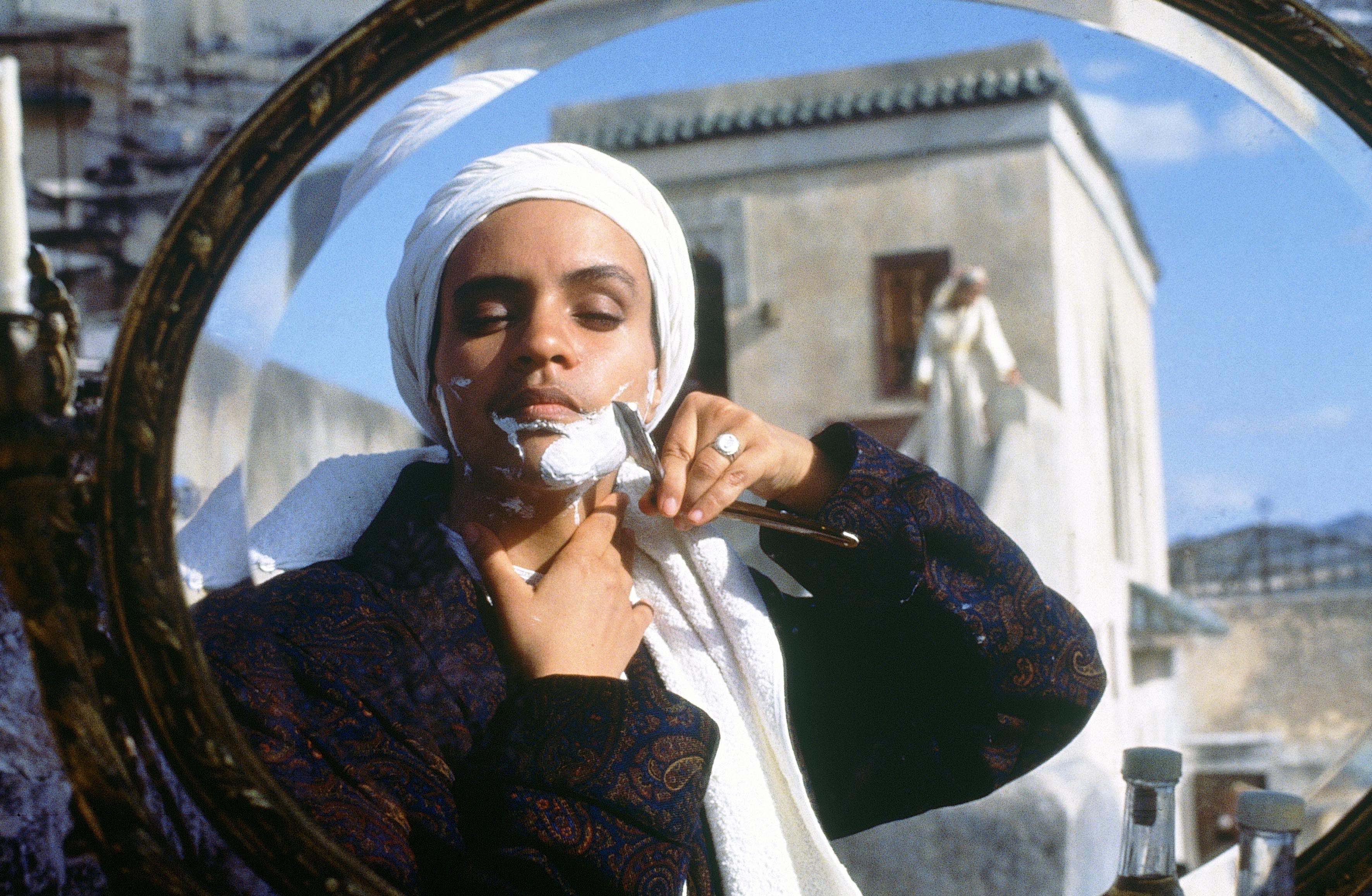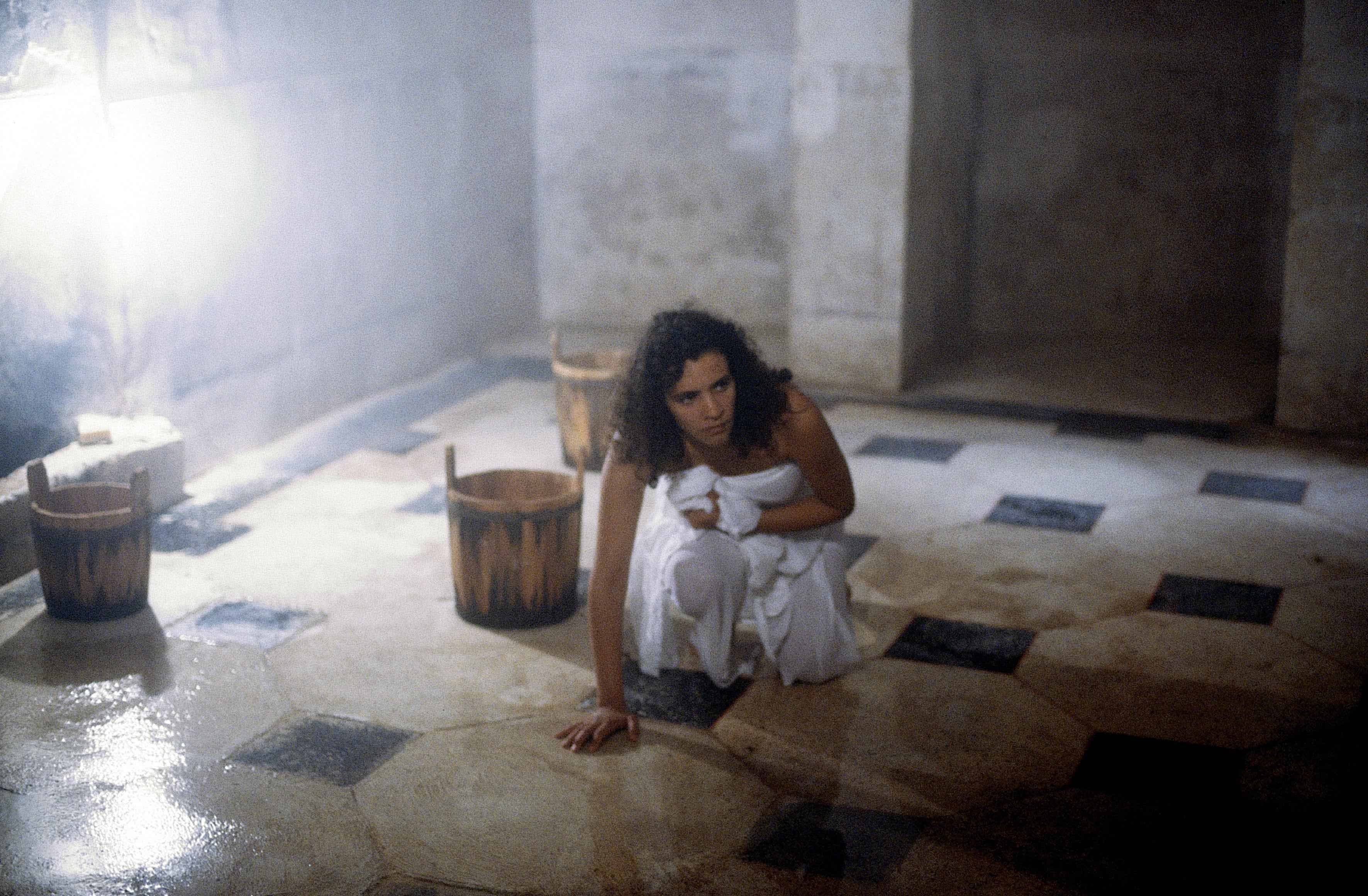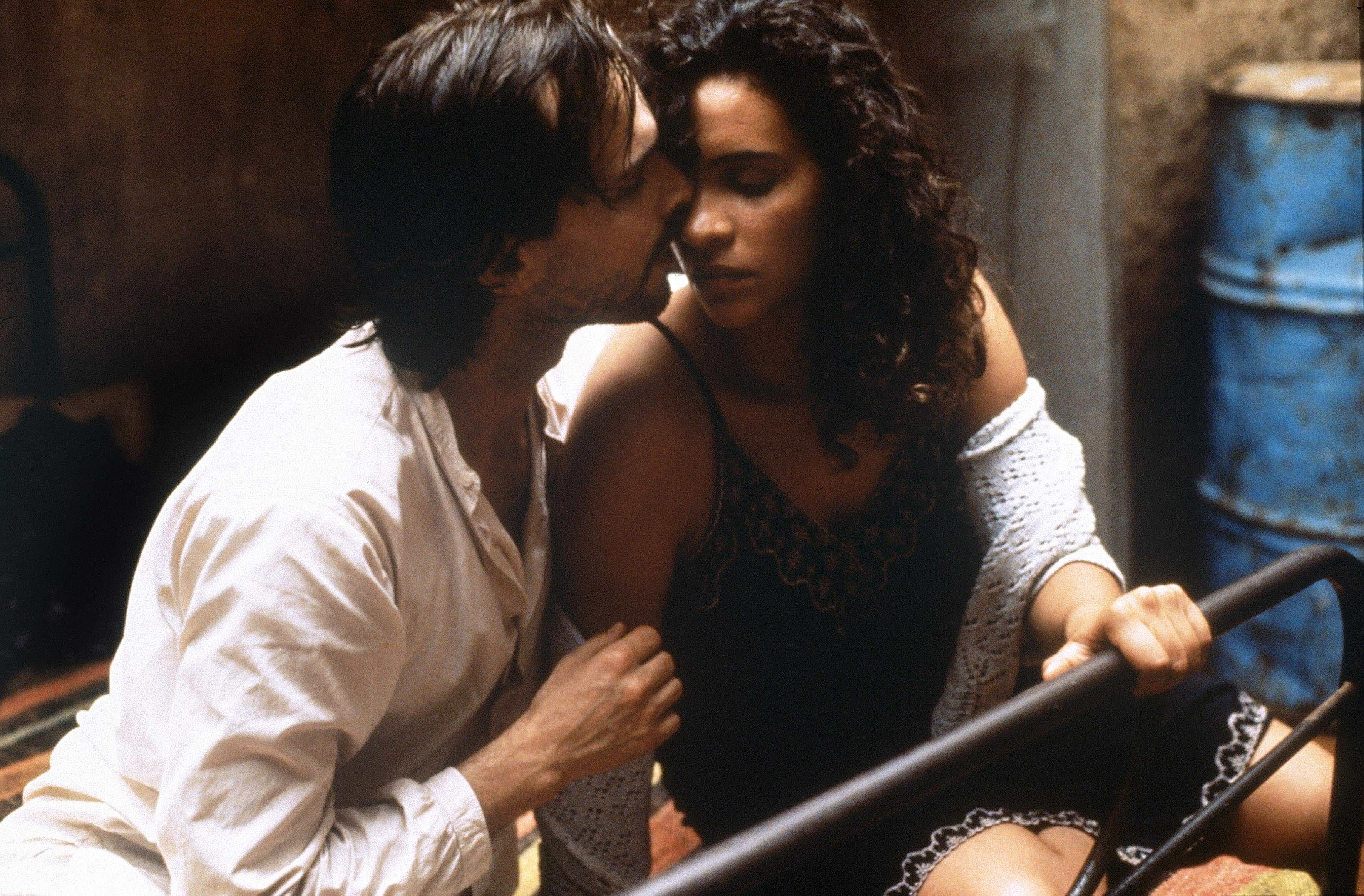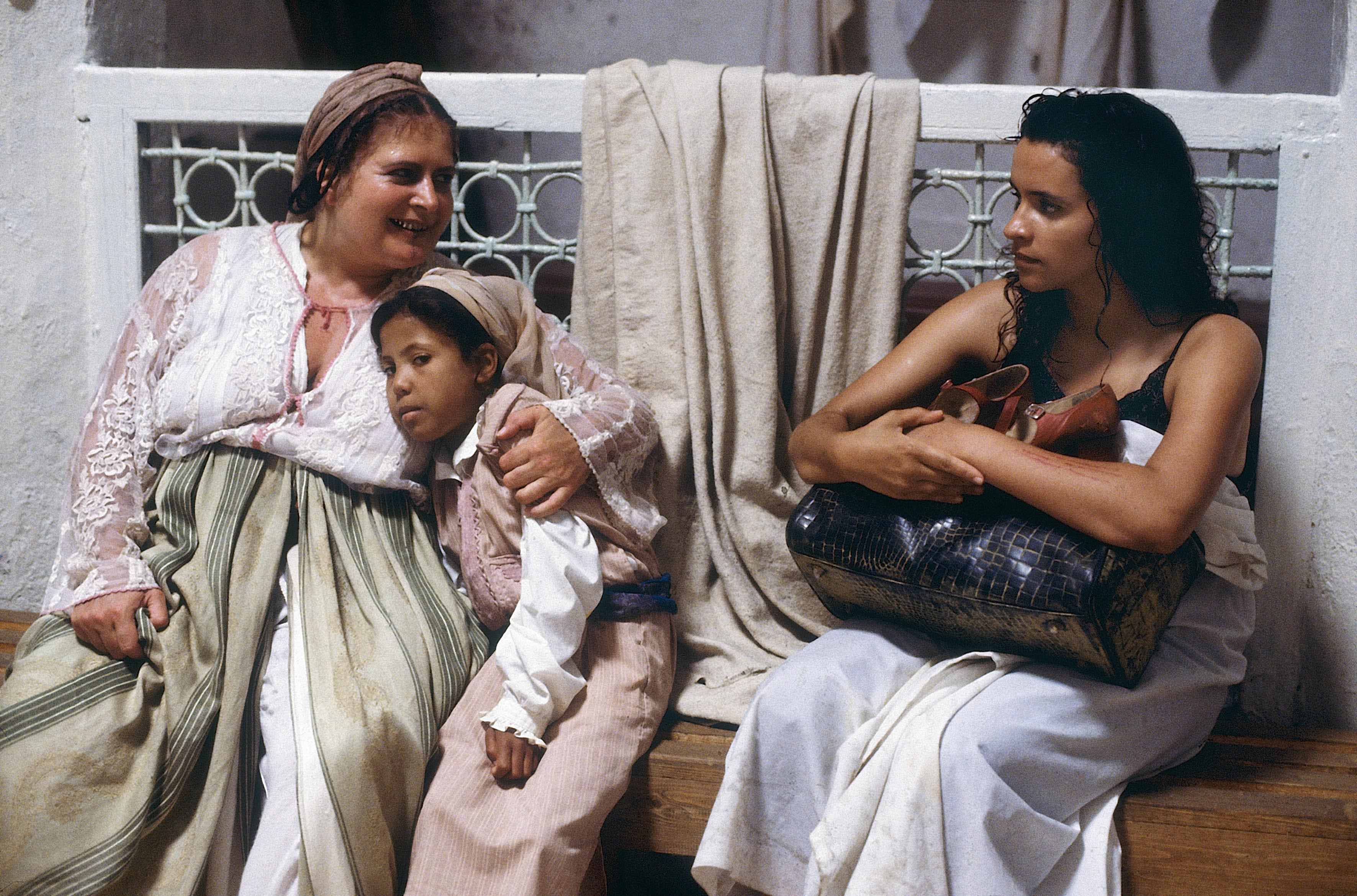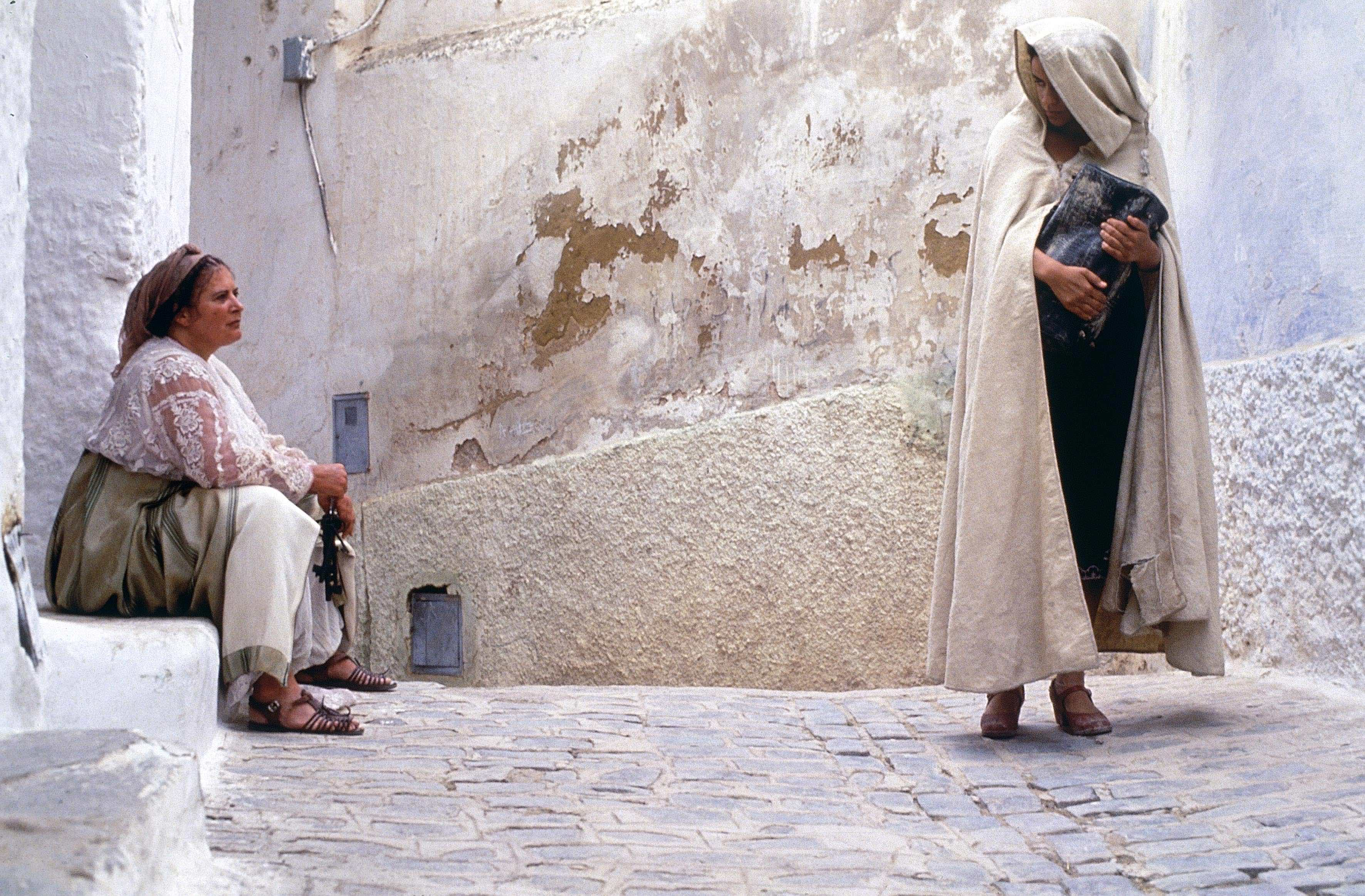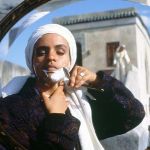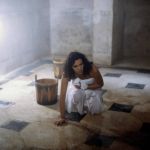Somewhere in Morocco, between 1920 and 1950... After having had seven daughters, an heirless father is convinced that a dark and distant curse has stricken his family. To foil the law of fate and to prevent his brother from getting his hands on his fortune, he decides that his eighth child will be a boy, even if it's born a girl. His name will be Ahmed, he will be raised in the tradition reserved for males and then rule his home and his business after his death… And so Ahmed is born, his eighth daughter. Authoritarian and enigmatic, Ahmed will live his first 21 years according to his father's desires, painfully concealing his identity without anyone knowing the truth. When he turns 21, following the chain of logic, he tells his father that he plans to wed his female cousin. Unable to bear the idea of this marriage that transgresses the final taboo, Ahmed's father calls him to his deathbed and begs him to renounce his plans. During this "Sacred Night", the 27th in the month of Ramadan, when the angels come down to earth to attempt to instil a little order in human affairs, Ahmed's father relieves himself of the crushing burden of his lie. He begs his daughter's pardon, asks her to resume her original identity and names her Zahra, just before dying… A few days later, Zahra buries Ahmed's things in her father's grave, then sets off to discover her female body and identity… She will soon be welcomed in a holy city by the Sitting Woman, a monumental figure who runs a bath-house, and her brother, the Consul, a blind man who teaches the Koran to children. As Zahra attempts to forget Ahmed, the Consul falls in love with her. This marks the start of a love story that will unleash the rage of the Sitting Woman. Blinded by her jealousy, she will attempt to enlighten the mystery of Zahra's past. The consequences of this discovery will make the story of Ahmed-Zahra a legend…
REVUE DE PRESSE
interview de Nicola Klotz concernant LA NUIT SACREE
The two novel by Tahar Ben Jelloun, L’enfant de Sable and La Nuit Sacrée (Prix Goncourt 1987), contain themes that […]
interview de Nicola Klotz concernant LA NUIT SACREE
The two novel by Tahar Ben Jelloun, L'enfant de Sable and La Nuit Sacrée (Prix Goncourt 1987), contain themes that are a constant in the author's work: dual identity, the journey of initiation, repressed desire, paternity… Which of those themes motivated your desire to film this adaptation ?
The father's deed fascinated me. I was won over by the madness of this man who, in wanting to "conceive" a child, dares to challenge divine will, his family, society and nature. At first sight, his act may seem reprehensible. In fact, behind this act lies a fabulous myth… What can be more beautiful and essential than giving life, than bringing a child into the world, of creating a work? The bond of love that links the father to Ahmed-Zahra, his son-daughter is incredibly strong. "I created you in the light… In coming into this world, you have left your mother's womb but not my mind… I imagined you being tall and handsome… You are tall and your beauty is enigmatic… The truth, my son. My daughter…" These words bear witness to the mad love of a father for his child. The creative deed of this man in such a coded and organized society troubled me deeply and interested me. When my wife Elisabeth and I had our first child, I had noticed that people only ever talked about the mother's desires. They never referred to those of the father. Psychoanalysts often find it hard to accept the fact that a man can also feel this same need to give birth. Ahmed is his father's work. I was fascinated by the destiny of Ahmed-Zahra who is eternally seeking a rebirth or rather a birth with her own identity. This illuminated being arouses this desire for rebirth in others. Beyond the curse that weighs down on her, Ahmed-Zahra represents the mystery of man's divine origins. Why are we only male or female? What is the share of each in the destiny of a human being?
J-M. G Le Clezio has given the following definition of the character of Ahmed: "Ahmed, the child of uncertain gender that his father's pride wanted to turn into a man, embodies all the ambiguities and fantasies of the human existence." What do you
think ?
J-M. Le Clezio has a writer's view. I certainly didn't want Ahmed to be an ambivalent, urban and "trendy" character playing on ambiguity as advertising does with young people. Ahmed isn't a perverse character but a being who is born as a man despite being a woman. His vision of the world is unique. I see her a little like a prophet… For me, Ahmed has always been a woman. Elisabeth, the screenwriter, probably because she is a woman, has naturally oriented her work in that direction, meaning that Ahmed is not a withdrawn, sickly and pained character but someone who takes the logic of her destiny to its conclusion. In relation to her father and to her sisters… In relation to her body too, to the extent of growing a moustache, for instance. Ahmed is an innocent character who has received the weight of the past as her inheritance. We are all born of the desire of a man and a woman. We are haunted by the desire of our parents and also of our grandparents. All of us, like Ahmed, can be the revelators of a repressed act that has weighed down on our families for generations. But I am much more interested in the immaterial and metaphysics than in sociology. I would never permit myself to talk about the condition of Muslim women. I wanted the film to go beyond the problem of sexual inequality. In the same way, I didn't want to use the story of Ahmed to deal with North Africa in terms of integration or power struggles. I am not attempting to carry out an in-depth analysis of these subjects, I'd rather experiment with the stuff that dreams are made of and take certain paradoxes of human nature through to their logical conclusion.
"And it was during this sacred night, the 27th in the month of Ramadan... When the angels and the Spirit descend with the permission of their Lord to arrange all things… That my father, then dying, called me to his bedside." That night, the "Sacred Night", Zahra discovers her true identity at last.
Every civilization has its "sacred night", such as Christmas Eve, for instance. I truly believe that there are magical nights when different forms of energy pass through us, moments when the sky opens and man is there, facing his truth. He must free himself of the lies in which he has imprisoned himself on a material level to join his creator. Zahra is freed by her father. He baptizes her Zahra and allows her to be reborn. The scene of this revelation is like a birth. The faces are marked by emotions that verge on ecstasy. With the help of the angels, her father abandons the social code to move towards the truth and love that he feels for his child.
And what should we think of the mother's attitude?
The mother is carried along by the father's madness. She feels that her daughter must return to the clan of the women. When the father dies, he frees his daughter. But the power struggle between Ahmed-Zahra and her mother is so strong that Ahmed doesn't tell her that he is now free to become Zahra again. Her mother sinks deeper and deeper into the madness of this act of which she is part. She cannot die. When Zahra returns to tell her that she is a woman, that she has returned to the clan of women, only then can her mother die. The mother's madness brings us into contact with another style of madness, that of creativity which leads us into fields that are beyond our understanding. I should like to mention the Tunisian stage actress, Jalila Baccar, who brings incredible presence the character of the mother. She has perfectly grasped the tragedy of this woman who sinks slowly into madness because she has accepted the lie, because she has even gone so far as to "hide the blood of fertility" of her daughter, Zahra.
With the Consul, Zahra discovers the pleasure of being with a man who has "eyes in his fingertips". A strange form of complicity unites them. "You and I come from the same dream as others come from the same country," the Consul tells Zahra.
All the characters in La Nuit Sacrée have a problem with their origins. For her father, Zahra was supposed to be Ahmed, a boy. The Sitting Woman is an undesired child "who fell like bad rain, the rain people fear because it rots the seeds." The Consul doesn't know where he is from and he doesn't really know if the Sitting Woman is his sister either. He exists because someone is dreaming him. Thanks to that, he is the "storyteller". The story that Ahmed is telling us with his inner voice. The Consul and Zahra are both haunted by images from the dawn of time. If you refer to Indian philosophy, every form of the universe, matter, human beings and animals originate from a single dream, that of Brahma. This dream is our creator in a similar, more developed way to the Judeo-Christian god. We are all born of the same dream, in time and in space. Someone dreams us, but who? The origins of the world are born from the division of matter and spirit; the human being from the division of man and woman. When Brahma wakes, the universe returns to his conscience and disintegrates. This is what we do each night. This is what the artist does when he creates a work. We are all born of the same dream. Meeting another person is a way of reaching out to another part of ourselves.
Your film follows the long tradition of Oriental tales. We are somewhere in the Orient, at an unspecified time…
I was first of all carried along by the fable and the legend. Beyond the existential questions, I have always been fascinated by the fact that a human being can communicate with another human being in an intuitive rather than an analytic way. Through a story grounded in reality, I wanted to use continual shifts in the tale to communicate a more universal view of the human condition. A myth is always more inspiring than a commonplace event even if the latter can be the founding matter of a myth. For example, the tale of Oedipus is originally an ordinary incident. Tahar Ben Jelloun has taken a known story, he has handed it onto us, we have made it our own and, through the cinema, we have returned it to the public in our own way. As in La Nuit Bengali, I wanted to use La Nuit Sacrée to explore the other side of the conscience. The Orient is the unconscious of the West. Just as the night is the unconscious of the day, man the unconscious of woman and vice versa. The Orient represents the nocturnal side of our civilization, the dream part. The history of our origins, our ancestors. I wanted to return to our collective memory.
The film opens with a virtuoso sequence. The camera enters the labyrinth of a souk. We dive into a mysterious world, with its secrets and traditions.
La Nuit Sacrée is a story that you cannot enter head-on; you first have to leave the real world to step into the shadows, into the night, as into a labyrinth leading to the end of the film and the light. From the very first shots, filmed in one of the butchers' alleyways in the Fez Medina, I wanted to give the audience this feeling of entering into a legend. It's a sort of initiatory journey. In the first part of the film, the scenes are often shown with a subjective camera since we are discovering this world through Ahmed's eyes, until his father's death. Afterwards, we follow Zahra. She is no longer paranoid since she recovers her identity little by little. Filming the Orient means entering another notion of time, the time of our origins, universal time. The borders vanish, resulting in the desire to abolish any cuts or limitations on the sequences, with a preference for single takes rather than short shots. It gives an impression of the fluidity of a dream that unfolds with real and unreal elements. I have always liked shooting long takes, as a sort of breather. I have had problems with asthma in the past and I've noticed that writers who suffer from asthma often write long sentences. It's biological! I need a sensation of freedom of movement, to accompany the actors and the mood, rather than show a dictatorial representation of images and feelings.
While favouring a certain aestheticism, you avoid the charms of exoticism.
I didn't want to play on the exoticism of the Orient through a gaudy reconstitution but rather get across the authenticity of the places, as in the scenes at the hammam, for instance. Having obtained permission to shoot in the Medina at Fez and in the holy town of Moulay Idriss, I didn't want to show clichéd images. I thought that it was much more interesting to try to fill myself with the history of these two towns, given that Fez is Tahar Ben Jelloun's birthplace. While we were shooting in the cemetery, I was very moved to discover certain scenes described by Tahar in his novels. Such connections lent power and density to the shoot.
Your film is a remarkable crossroads for the encounter of talents from different origins and artistic backgrounds.
I wanted La Nuit Sacrée to be a gathering of singular people from different societies and world. A crossroads of identities that could inspire me. Tahar Ben Jelloun is a Moroccan author. Amina is a Tunisian singer and this is her first leading role in a film. Miguel Bosé is a Spanish actor. Goran Bregovic, a Serbo-Croat composer. Carlo Varini is a Swiss Italian director of photography. I have various origins. As a Jew, I am marked by the pain of the story of my grandfather who was a death camp survivor. I wanted the shoot to be a sort of hymn to the possibility of uniting dreams to cancel out our borders. Cinema means the free movement of dreams. I should like the film's audience to agree to open up to a space that one could call "prayer", not only in the Christian sense that Tarkovski referred to but as a sort of window onto the unconscious. I'd like them to pause for a second to listen to others.
Tell us a little about the composer Goran Bregovic whose talents have already been displayed in his scores for Kusturica's films, The Time of the Gypsies and Arizona Dream.
Goran discovered the film as we were starting to cut it. He immediately sensed that the music needed to enter the film slyly, seep into it in a way, before gaining its full scope and breathing with the images. We didn't want a typical film score but an atmospheric one with sensations of silence and suspended moments. In fact, the music follows its path under the image before suddenly reappearing. It breathes with the film in a movement of great fluidity. The two songs sung by a gipsy express the full burden of suffering. I like the singer's broken voice: it seems to have told so many stories since the dawn of time. Way before Ahmed's legend began.
Amina is remarkable in the dual role of Ahmed-Zahra. After High Heels Miguel Bosé confirms his acting skills.
What I liked about Amina was the idea that she wasn't originally an actress but rather someone new in relation to the cinema. Through her profane side, Amina gives amazing power to Ahmed-Zahra who also has to discover male codes in becoming Ahmed. Throughout, Amina gives a very modern authenticity and genuine innocence to her character. I was very surprised by her way of being there, always pitch perfect. Amina also worked before the shoot with Elisabeth Perceval to prepare her character. Thanks to this collaboration between women, Amina was able to explore the intimate and dual zones of her character in depth. Then, during the shoot, we decided on each intent, gesture, look and movement together so that she could be free of all acting constraints for the take. Then, Amina could let herself go, both in this sort of almost masculine power, a little like a gang leader, and in her female vulnerability and fragility. During the shoot, Amina often spoke of the confusion and loss of identity of her character that she felt strongly. Miguel Bosé is a virtuoso actor. He loves the finer points of acting and can play his character in a totally restrained way or, on the contrary, with incredible expressionism. Child-like and radiant in the scene with the children and the mirror, he can become disturbing in the hammam scene or deeply moving in the "perfumed meadow" scene. Michel is magnificent because he enters into a sort of complicity with his character without needing to analyse it. Two or three conversations before the shoot are enough. During the takes, he would throw himself into the scenes when he was totally blinded by opaque contact lenses. We would prepare the long single takes by walking together to establish his movements precisely. He would get his bearings from the number of footsteps, the heat coming off a spotlight, etc. Despite these very concrete imperatives, Miguel catches fire in a very subtle performance as soon as the camera starts up. He gives all he's got.
How did you want to deal with the sensuality of the relationship between Zahra and the Consul ?
In La Nuit Sacrée, Amina and Miguel Bosé present a totally new facet of their personality and talent. They offer a totally different range of emotions compared to their performances in, say, The Sheltering Sky or High Heels. I wanted a special form of modesty and sensuality in the relationship between Zahra and the Consul. I didn't want to resume the sensuality of their relationship in a simple physical expression performed by actors. I didn't want to be immodest or fall into the tap of cliché. On the contrary, I wanted to show other feelings and sensations. The important thing was to get close to their secret emotions. Zahra cannot forget overnight that she has been raised as a man for twenty years. We can guess at the birth of sensuality in the close-up in prison when Zahra, wearing a blindfold, smiles. We can tell then that the woman has been "born". But to be born as a woman, she has to kill Ahmed first. The Consul also has a history with his body. Because of his hysterical and ambiguous bond with his sister, his only contact with women is at the brothel. The Consul is an imprisoned man who knows nothing of his origins. He lives in a sort of black hole. The suicide threats, the razors, etc. are the expression of his lack of balance. He is governed more by dizziness than sensuality. The story of la Nuit Sacrée is improbable. It's the surprising encounter of a woman who used to be a man with a blind man who doesn't know where he comes from. In the same way, the encounter of these two actors from different backgrounds, Amina and Miguel Bosé, is so surprising that it allows grace to exist. The improbability gives rise to a magnificent couple.
The father's deed fascinated me. I was won over by the madness of this man who, in wanting to "conceive" a child, dares to challenge divine will, his family, society and nature. At first sight, his act may seem reprehensible. In fact, behind this act lies a fabulous myth… What can be more beautiful and essential than giving life, than bringing a child into the world, of creating a work? The bond of love that links the father to Ahmed-Zahra, his son-daughter is incredibly strong. "I created you in the light… In coming into this world, you have left your mother's womb but not my mind… I imagined you being tall and handsome… You are tall and your beauty is enigmatic… The truth, my son. My daughter…" These words bear witness to the mad love of a father for his child. The creative deed of this man in such a coded and organized society troubled me deeply and interested me. When my wife Elisabeth and I had our first child, I had noticed that people only ever talked about the mother's desires. They never referred to those of the father. Psychoanalysts often find it hard to accept the fact that a man can also feel this same need to give birth. Ahmed is his father's work. I was fascinated by the destiny of Ahmed-Zahra who is eternally seeking a rebirth or rather a birth with her own identity. This illuminated being arouses this desire for rebirth in others. Beyond the curse that weighs down on her, Ahmed-Zahra represents the mystery of man's divine origins. Why are we only male or female? What is the share of each in the destiny of a human being?
J-M. G Le Clezio has given the following definition of the character of Ahmed: "Ahmed, the child of uncertain gender that his father's pride wanted to turn into a man, embodies all the ambiguities and fantasies of the human existence." What do you
think ?
J-M. Le Clezio has a writer's view. I certainly didn't want Ahmed to be an ambivalent, urban and "trendy" character playing on ambiguity as advertising does with young people. Ahmed isn't a perverse character but a being who is born as a man despite being a woman. His vision of the world is unique. I see her a little like a prophet… For me, Ahmed has always been a woman. Elisabeth, the screenwriter, probably because she is a woman, has naturally oriented her work in that direction, meaning that Ahmed is not a withdrawn, sickly and pained character but someone who takes the logic of her destiny to its conclusion. In relation to her father and to her sisters… In relation to her body too, to the extent of growing a moustache, for instance. Ahmed is an innocent character who has received the weight of the past as her inheritance. We are all born of the desire of a man and a woman. We are haunted by the desire of our parents and also of our grandparents. All of us, like Ahmed, can be the revelators of a repressed act that has weighed down on our families for generations. But I am much more interested in the immaterial and metaphysics than in sociology. I would never permit myself to talk about the condition of Muslim women. I wanted the film to go beyond the problem of sexual inequality. In the same way, I didn't want to use the story of Ahmed to deal with North Africa in terms of integration or power struggles. I am not attempting to carry out an in-depth analysis of these subjects, I'd rather experiment with the stuff that dreams are made of and take certain paradoxes of human nature through to their logical conclusion.
"And it was during this sacred night, the 27th in the month of Ramadan... When the angels and the Spirit descend with the permission of their Lord to arrange all things… That my father, then dying, called me to his bedside." That night, the "Sacred Night", Zahra discovers her true identity at last.
Every civilization has its "sacred night", such as Christmas Eve, for instance. I truly believe that there are magical nights when different forms of energy pass through us, moments when the sky opens and man is there, facing his truth. He must free himself of the lies in which he has imprisoned himself on a material level to join his creator. Zahra is freed by her father. He baptizes her Zahra and allows her to be reborn. The scene of this revelation is like a birth. The faces are marked by emotions that verge on ecstasy. With the help of the angels, her father abandons the social code to move towards the truth and love that he feels for his child.
And what should we think of the mother's attitude?
The mother is carried along by the father's madness. She feels that her daughter must return to the clan of the women. When the father dies, he frees his daughter. But the power struggle between Ahmed-Zahra and her mother is so strong that Ahmed doesn't tell her that he is now free to become Zahra again. Her mother sinks deeper and deeper into the madness of this act of which she is part. She cannot die. When Zahra returns to tell her that she is a woman, that she has returned to the clan of women, only then can her mother die. The mother's madness brings us into contact with another style of madness, that of creativity which leads us into fields that are beyond our understanding. I should like to mention the Tunisian stage actress, Jalila Baccar, who brings incredible presence the character of the mother. She has perfectly grasped the tragedy of this woman who sinks slowly into madness because she has accepted the lie, because she has even gone so far as to "hide the blood of fertility" of her daughter, Zahra.
With the Consul, Zahra discovers the pleasure of being with a man who has "eyes in his fingertips". A strange form of complicity unites them. "You and I come from the same dream as others come from the same country," the Consul tells Zahra.
All the characters in La Nuit Sacrée have a problem with their origins. For her father, Zahra was supposed to be Ahmed, a boy. The Sitting Woman is an undesired child "who fell like bad rain, the rain people fear because it rots the seeds." The Consul doesn't know where he is from and he doesn't really know if the Sitting Woman is his sister either. He exists because someone is dreaming him. Thanks to that, he is the "storyteller". The story that Ahmed is telling us with his inner voice. The Consul and Zahra are both haunted by images from the dawn of time. If you refer to Indian philosophy, every form of the universe, matter, human beings and animals originate from a single dream, that of Brahma. This dream is our creator in a similar, more developed way to the Judeo-Christian god. We are all born of the same dream, in time and in space. Someone dreams us, but who? The origins of the world are born from the division of matter and spirit; the human being from the division of man and woman. When Brahma wakes, the universe returns to his conscience and disintegrates. This is what we do each night. This is what the artist does when he creates a work. We are all born of the same dream. Meeting another person is a way of reaching out to another part of ourselves.
Your film follows the long tradition of Oriental tales. We are somewhere in the Orient, at an unspecified time…
I was first of all carried along by the fable and the legend. Beyond the existential questions, I have always been fascinated by the fact that a human being can communicate with another human being in an intuitive rather than an analytic way. Through a story grounded in reality, I wanted to use continual shifts in the tale to communicate a more universal view of the human condition. A myth is always more inspiring than a commonplace event even if the latter can be the founding matter of a myth. For example, the tale of Oedipus is originally an ordinary incident. Tahar Ben Jelloun has taken a known story, he has handed it onto us, we have made it our own and, through the cinema, we have returned it to the public in our own way. As in La Nuit Bengali, I wanted to use La Nuit Sacrée to explore the other side of the conscience. The Orient is the unconscious of the West. Just as the night is the unconscious of the day, man the unconscious of woman and vice versa. The Orient represents the nocturnal side of our civilization, the dream part. The history of our origins, our ancestors. I wanted to return to our collective memory.
The film opens with a virtuoso sequence. The camera enters the labyrinth of a souk. We dive into a mysterious world, with its secrets and traditions.
La Nuit Sacrée is a story that you cannot enter head-on; you first have to leave the real world to step into the shadows, into the night, as into a labyrinth leading to the end of the film and the light. From the very first shots, filmed in one of the butchers' alleyways in the Fez Medina, I wanted to give the audience this feeling of entering into a legend. It's a sort of initiatory journey. In the first part of the film, the scenes are often shown with a subjective camera since we are discovering this world through Ahmed's eyes, until his father's death. Afterwards, we follow Zahra. She is no longer paranoid since she recovers her identity little by little. Filming the Orient means entering another notion of time, the time of our origins, universal time. The borders vanish, resulting in the desire to abolish any cuts or limitations on the sequences, with a preference for single takes rather than short shots. It gives an impression of the fluidity of a dream that unfolds with real and unreal elements. I have always liked shooting long takes, as a sort of breather. I have had problems with asthma in the past and I've noticed that writers who suffer from asthma often write long sentences. It's biological! I need a sensation of freedom of movement, to accompany the actors and the mood, rather than show a dictatorial representation of images and feelings.
While favouring a certain aestheticism, you avoid the charms of exoticism.
I didn't want to play on the exoticism of the Orient through a gaudy reconstitution but rather get across the authenticity of the places, as in the scenes at the hammam, for instance. Having obtained permission to shoot in the Medina at Fez and in the holy town of Moulay Idriss, I didn't want to show clichéd images. I thought that it was much more interesting to try to fill myself with the history of these two towns, given that Fez is Tahar Ben Jelloun's birthplace. While we were shooting in the cemetery, I was very moved to discover certain scenes described by Tahar in his novels. Such connections lent power and density to the shoot.
Your film is a remarkable crossroads for the encounter of talents from different origins and artistic backgrounds.
I wanted La Nuit Sacrée to be a gathering of singular people from different societies and world. A crossroads of identities that could inspire me. Tahar Ben Jelloun is a Moroccan author. Amina is a Tunisian singer and this is her first leading role in a film. Miguel Bosé is a Spanish actor. Goran Bregovic, a Serbo-Croat composer. Carlo Varini is a Swiss Italian director of photography. I have various origins. As a Jew, I am marked by the pain of the story of my grandfather who was a death camp survivor. I wanted the shoot to be a sort of hymn to the possibility of uniting dreams to cancel out our borders. Cinema means the free movement of dreams. I should like the film's audience to agree to open up to a space that one could call "prayer", not only in the Christian sense that Tarkovski referred to but as a sort of window onto the unconscious. I'd like them to pause for a second to listen to others.
Tell us a little about the composer Goran Bregovic whose talents have already been displayed in his scores for Kusturica's films, The Time of the Gypsies and Arizona Dream.
Goran discovered the film as we were starting to cut it. He immediately sensed that the music needed to enter the film slyly, seep into it in a way, before gaining its full scope and breathing with the images. We didn't want a typical film score but an atmospheric one with sensations of silence and suspended moments. In fact, the music follows its path under the image before suddenly reappearing. It breathes with the film in a movement of great fluidity. The two songs sung by a gipsy express the full burden of suffering. I like the singer's broken voice: it seems to have told so many stories since the dawn of time. Way before Ahmed's legend began.
Amina is remarkable in the dual role of Ahmed-Zahra. After High Heels Miguel Bosé confirms his acting skills.
What I liked about Amina was the idea that she wasn't originally an actress but rather someone new in relation to the cinema. Through her profane side, Amina gives amazing power to Ahmed-Zahra who also has to discover male codes in becoming Ahmed. Throughout, Amina gives a very modern authenticity and genuine innocence to her character. I was very surprised by her way of being there, always pitch perfect. Amina also worked before the shoot with Elisabeth Perceval to prepare her character. Thanks to this collaboration between women, Amina was able to explore the intimate and dual zones of her character in depth. Then, during the shoot, we decided on each intent, gesture, look and movement together so that she could be free of all acting constraints for the take. Then, Amina could let herself go, both in this sort of almost masculine power, a little like a gang leader, and in her female vulnerability and fragility. During the shoot, Amina often spoke of the confusion and loss of identity of her character that she felt strongly. Miguel Bosé is a virtuoso actor. He loves the finer points of acting and can play his character in a totally restrained way or, on the contrary, with incredible expressionism. Child-like and radiant in the scene with the children and the mirror, he can become disturbing in the hammam scene or deeply moving in the "perfumed meadow" scene. Michel is magnificent because he enters into a sort of complicity with his character without needing to analyse it. Two or three conversations before the shoot are enough. During the takes, he would throw himself into the scenes when he was totally blinded by opaque contact lenses. We would prepare the long single takes by walking together to establish his movements precisely. He would get his bearings from the number of footsteps, the heat coming off a spotlight, etc. Despite these very concrete imperatives, Miguel catches fire in a very subtle performance as soon as the camera starts up. He gives all he's got.
How did you want to deal with the sensuality of the relationship between Zahra and the Consul ?
In La Nuit Sacrée, Amina and Miguel Bosé present a totally new facet of their personality and talent. They offer a totally different range of emotions compared to their performances in, say, The Sheltering Sky or High Heels. I wanted a special form of modesty and sensuality in the relationship between Zahra and the Consul. I didn't want to resume the sensuality of their relationship in a simple physical expression performed by actors. I didn't want to be immodest or fall into the tap of cliché. On the contrary, I wanted to show other feelings and sensations. The important thing was to get close to their secret emotions. Zahra cannot forget overnight that she has been raised as a man for twenty years. We can guess at the birth of sensuality in the close-up in prison when Zahra, wearing a blindfold, smiles. We can tell then that the woman has been "born". But to be born as a woman, she has to kill Ahmed first. The Consul also has a history with his body. Because of his hysterical and ambiguous bond with his sister, his only contact with women is at the brothel. The Consul is an imprisoned man who knows nothing of his origins. He lives in a sort of black hole. The suicide threats, the razors, etc. are the expression of his lack of balance. He is governed more by dizziness than sensuality. The story of la Nuit Sacrée is improbable. It's the surprising encounter of a woman who used to be a man with a blind man who doesn't know where he comes from. In the same way, the encounter of these two actors from different backgrounds, Amina and Miguel Bosé, is so surprising that it allows grace to exist. The improbability gives rise to a magnificent couple.




